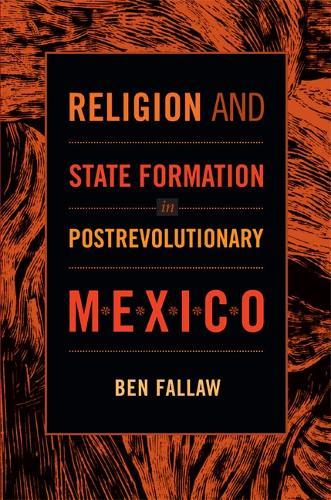Overview
The religion question-the place of the Church in a Catholic country after an anticlerical revolution-profoundly shaped the process of state formation in Mexico. From the end of the Cristero War in 1929 until Manuel Ávila Camacho assumed the presidency in late 1940 and declared his faith, Mexico's unresolved religious conflict roiled regional politics, impeded federal schooling, undermined agrarian reform, and flared into sporadic violence, ultimately frustrating the secular vision shared by Plutarco ElÍas Calles and LÁzaro CÁrdenas. Ben Fallaw argues that previous scholarship has not appreciated the pervasive influence of Catholics and Catholicism on postrevolutionary state formation. By delving into the history of four understudied Mexican states, he is able to show that religion swayed regional politics not just in states such as Guanajuato, in Mexico's central-west ""Rosary Belt,"" but even in those considered much less observant, including Campeche, Guerrero, and Hidalgo. Religion and State Formation in Postrevolutionary Mexico reshapes our understanding of agrarian reform, federal schooling, revolutionary anticlericalism, elections, the Segunda (a second Cristero War in the 1930s), and indigenism, the Revolution's valorization of the Mesoamerican past as the font of national identity.
Full Product Details
Author: Ben Fallaw
Publisher: Duke University Press
Imprint: Duke University Press
Dimensions:
Width: 15.60cm
, Height: 2.00cm
, Length: 23.50cm
Weight: 0.481kg
ISBN: 9780822353379
ISBN 10: 0822353377
Pages: 277
Publication Date: 21 January 2013
Audience:
Professional and scholarly
,
Professional & Vocational
Format: Paperback
Publisher's Status: Active
Availability: In Print

This item will be ordered in for you from one of our suppliers. Upon receipt, we will promptly dispatch it out to you. For in store availability, please contact us.
Reviews
Religion and State Formation in Postrevolutionary Mexico should establish itself as a key text in Mexican revolutionary history. The author has done a prodigious quantity of research and organized it expertly, producing an original and convincing analysis of a major theme: Church-state conflict in the post-revolutionary period. The issue permeated Mexican politics and its exploration opens a window onto a variety of other themes, including state building, education, land reform, gender, ethnicity, violence, and local politics and elections. Alan Knight, author of The Mexican Revolution
""Religion and State Formation in Postrevolutionary Mexico should establish itself as a key text in Mexican revolutionary history. The author has done a prodigious quantity of research and organized it expertly, producing an original and convincing analysis of a major theme: Church-state conflict in the post-revolutionary period. The issue permeated Mexican politics and its exploration opens a window onto a variety of other themes, including state building, education, land reform, gender, ethnicity, violence, and local politics and elections."" Alan Knight, author of The Mexican Revolution
Religion and State Formation in Postrevolutionary Mexico should establish itself as a key text in Mexican revolutionary history. The author has done a prodigious quantity of research and organized it expertly, producing an original and convincing analysis of a major theme: Church-state conflict in the postrevolutionary period. The issue permeated Mexican politics, and its exploration opens a window onto a variety of other themes, including state building, education, land reform, gender, ethnicity, violence, and local politics and elections. -Alan Knight, author of The Mexican Revolution This important book forces a rethinking of the efficacy and influence of agrarian and cultural revolutions not only in Mexico but throughout the world. In what is nothing short of a massive reappraisal of the pivotal presidency of Lazaro Cardenas, Ben Fallaw demonstrates how conservative Catholic opposition at the local and state levels consistently obstructed Cardenista reform. Based on his detailed reconstruction of circumstances and events in four very different Mexican states, he reminds us that conditions differed enormously among locales, even between two villages in the same state. His research is blockbuster in every possible way. -Terry Rugeley, author of Of Wonders and Wise Men: Religion and Popular Cultures in Southeast Mexico, 1800-1876 In this impressively researched, organized, and written work, Fallaw (Colby College) examines one of the major themes facing Mexico in the 1930s-the conflict between the Catholic Church and the state. -- J. B. Kirkwood Choice ...the author provides one of the best portraits of how the Mexican state's anticlericalism, rationalist educational reforms, land reform, anticlerical agitation, and indigenism were intertwined and thus galvanized opponents. -- Edward Wright-Rios American Historical Review Fallaw's study proves utterly striking, as his study details in multiple ways clerical and governmental failures to serve the basic needs of an impoverished and poorly educated public. His study reveals some of the ways that widespread cultural ignorance of the complex material cultural needs of the Mexican population persisted during the postrevolutionary period. -- Marjorie Becker Catholic Historical Review [Fallaw's] careful marshaling of evidence and his sound analysis make clear why agrarian reform and changing religious practice and devotion were extremely difficult to achieve. -- Linda B. Hall Hispanic American Historical Review Overall, Religion and State Formation in Postrevolutionary Mexico is one of the most important books on twentieth century Mexico of the last ten years. Original, thoroughly researched, and ambitious in scope, the work is a must read for those interested in revolutionary Mexico, modern Catholic sensibilities, or the overlap of politics and religion. -- Benjamin Smith The Americas Ben Fallaw's extraordinary new book, Religion and State Formation in Postrevolutionary Mexico, ostensibly explains religious violence in four Mexican states: Campeche, Hidalgo, Guerrero, and Guanajuato. In the process, however, Fallaw tells us much more. Challenging a number of widely held assumptions about this period, he describes convincingly how and why the revolutionary project failed in the countryside. -- Stephanie Mitchell The Latin Americanist
Author Information
Ben Fallaw is Associate Professor of History and Latin American Studies at Colby College. He is the author of CÁrdenas Compromised: The Failure of Reform in Postrevolutionary YucatÁn, also published by Duke University Press, and a coeditor of Peripheral Visions: Politics, Society, and the Challenges of Modernity in Yucatan and Heroes and Hero Cults in Latin America.



